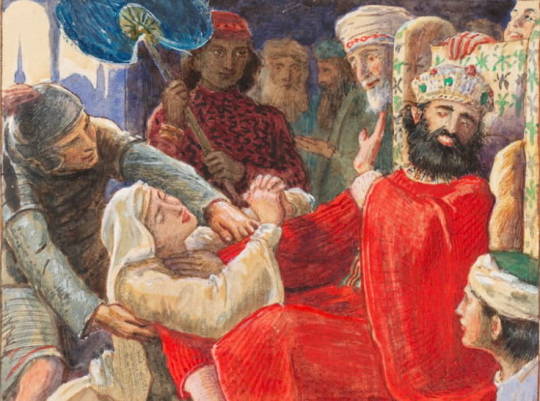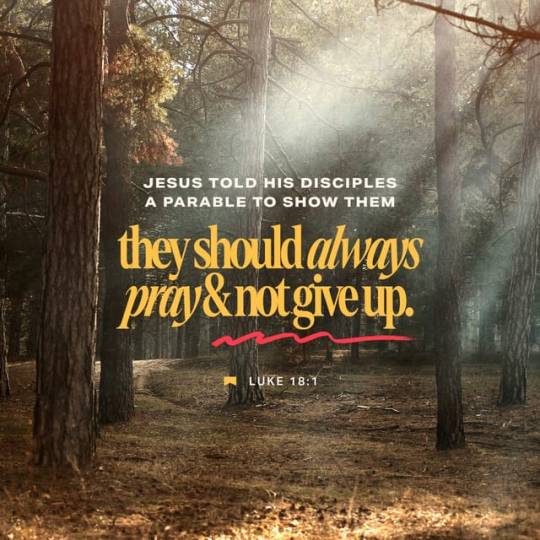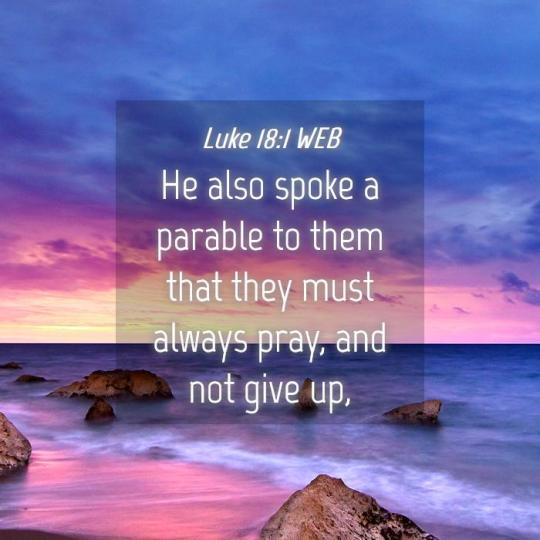#the Parable of the Persistent Widow
Text
The Parable of the Persistent Widow

1 And he spake also a simile to them, that it behoveth [us] always to pray, and not to faint,
2 saying, `A certain judge was in a certain city -- God he is not fearing, and man he is not regarding --
3 and a widow was in that city, and she was coming unto him, saying, Do me justice on my opponent,
4 and he would not for a time, but after these things he said in himself, Even if God I do not fear, and man do not regard,
5 yet because this widow doth give me trouble, I will do her justice, lest, perpetually coming, she may plague me.'
6 And the Lord said, `Hear ye what the unrighteous judge saith:
7 and shall not God execute the justice to His choice ones, who are crying unto Him day and night -- bearing long in regard to them?
8 I say to you, that He will execute the justice to them quickly; but the Son of Man having come, shall he find the faith upon the earth?'
The Pharisee and the Tax Collector
9 And he spake also unto certain who have been trusting in themselves that they were righteous, and have been despising the rest, this simile:
10 `Two men went up to the temple to pray, the one a Pharisee, and the other a tax-gatherer;
11 the Pharisee having stood by himself, thus prayed: God, I thank Thee that I am not as the rest of men, rapacious, unrighteous, adulterers, or even as this tax-gatherer;
12 I fast twice in the week, I give tithes of all things -- as many as I possess.
13 `And the tax-gatherer, having stood afar off, would not even the eyes lift up to the heaven, but was smiting on his breast, saying, God be propitious to me -- the sinner!
14 I say to you, this one went down declared righteous, to his house, rather than that one: for every one who is exalting himself shall be humbled, and he who is humbling himself shall be exalted.'
Let the Children Come to Me
15 And they were bringing near also the babes, that he may touch them, and the disciples having seen did rebuke them,
16 and Jesus having called them near, said, `Suffer the little children to come unto me, and forbid them not, for of such is the reign of God;
17 verily I say to you, Whoever may not receive the reign of God as a little child, may not enter into it.'
— Luke 18:1-17 | Young's Literal Translation (YLT)
Young's Literal Translation of the Holy Bible is in the public domain.
Cross References: Exodus 22:23; 2 Samuel 12:13; 1 Kings 10:5; 2 Kings 20:5; Ezra 9:6; Psalm 88:1; Proverbs 20:6; Proverbs 29:23; Proverbs 30:12; Isaiah 40:27; Isaiah 40:31; Isaiah 58:3; Isaiah 62:7; Isaiah 66:2; Matthew 5:20; Matthew 5:25; Matthew 5:45; Matthew 18:3; Matthew 19:13-14; Mark 10:13; Mark 10:15; Luke 7:13; Luke 11:8; Luke 11:42; Luke 20:13; Romans 14:3; Romans 14:10; 1 Corinthians 9:27; Hebrews 12:9
#the Parable of the Persistent Widow#the Pharisee and the Tax Collector#Jesus blesses children#Luke 18:1-17#Gospel of Luke#New Testament#YLT#Young's Literal Translation of the Holy Bible
12 notes
·
View notes
Text
youtube
Persevere! The Devil Won't Quit! We Must Never Give Up!
Website GloryToGodVideos.com
#antichrist trump#antichrist#trump antichrist#the antichrist#the beast#bible study#keep on keeping on#parable of the persistent widow#Youtube
1 note
·
View note
Text
The Parable Of The Persistent Widow
And he told them a parable to the effect that they ought always to pray and not lose heart. He said, “In a certain city there was a judge who neither feared God nor respected man. And there was a widow in that city who kept coming to him and saying, ‘Give me justice against my adversary.’ For a while he refused, but afterward he said to himself, ‘Though I neither fear God nor respect man, yet…
View On WordPress
0 notes
Text










🇵🇷 VBS at San Pablo is continuing this week. Our lessons and crafts have been in relation to the Fruits of the Spirit and some parables from the New Testament ranging from The Good Samaritan to The Persistent Widow, and the Mustard Seed. 🎨🍎🍋🍓🍇🍍
#vbs#kids arts and crafts#The Fruits of the Spirit#New Testament Bible stories#Parables of Jesus#The Good Samaritan#The Persistent Widow#The Parable of the Mustard Seed#youth camp#youth ministry
1 note
·
View note
Text
The Parable of the Persistent Widow (Luke 18:1-8)
“God desires of us nothing more ardently than that we ask many and great things of him, and he is displeased if we do not confidently ask and entreat.” Martin Luther
“The Persistent Widow” by Ronnie Farmer, Jr.
Then Jesus told his disciples a parable to show them that they should always pray and not give up. He said: “In a certain town there was a judge who neither feared God nor cared what people thought. And there was a widow in that town who kept coming to him with the plea, ‘Grant me justice against my adversary.’
“For some time he refused. But finally…

View On WordPress
#believe#christ&039;s parables#christ&039;s teaching#christian faith#christian life#christian prayer#christian spirituality#christianity#faith#gospel of luke#impatience#jesus christ#justice#luke 18#parable#parable of the persistent widow#patience#perseverance#pray#prayer
0 notes
Photo

The Parable of the Persistent Widow ~ Luke 18: 1-8
Then Jesus told his disciples a parable to show them that they should always pray and not give up. He said: “In a certain town there was a judge who neither feared God nor cared what people thought. And there was a widow in that town who kept coming to him with the plea, ‘Grant me justice against my adversary.’
“For some time he refused. But finally he said to himself, ‘Even though I don’t fear God or care what people think, yet because this widow keeps bothering me, I will see that she gets justice, so that she won’t eventually come and attack me!’”
And the Lord said, “Listen to what the unjust judge says. And will not God bring about justice for his chosen ones, who cry out to him day and night? Will he keep putting them off? I tell you, he will see that they get justice, and quickly. However, when the Son of Man comes, will he find faith on the earth?”
Via Verse of the Day - Luke 18:1
#Jesus#parables#Bible verses#scripture#persistence#pray#don't give up#justice#adversary#God#Lord#chosen ones#Son of Man#faith
15 notes
·
View notes
Note
I was listening to a brief debate between a Protestant and a Catholic about Mary & whether or not she was sinless. I'm not Catholic myself, but I felt that the Catholic didn't represent his position well. The Protestant said that scripture had evidence of Mary sinning. He cited the passage of the Wedding at Cana in John 2, saying that Mary was wrong to ask Jesus to do a miracle when He did not intend to start his ministry yet. Then he cited Luke 1, talking about how Zachariah was punished for doubting the angel Gabriel when he told him he would have a sin. He argued that Mary sinned in the same way by doubting the angel when he told her she would conceive because she was a virgin. Again, I'm not a Catholic so my church doesn't try to argue scripture teaches Mary was sinless. But I didn't see the Protestant's citations as proof that Mary's sins were recorded in scripture. I think those verses show that Mary is human and not omniscient. What's your take.
Another thing mentioned in the debate was whether or not Mary needed to be conceived without sin in order to have Jesus. The Catholic said Mary could not carry Jesus in sin. The Protestant said that if Mary had to be sinless to conceive the sinless Jesus, then Mary's parents would have to be sinless in order to conceive her. When the Catholic said this didn't apply to Mary, the Protestant replied by saying that in that case, Mary was a greater "god" than Jesus because she could be born sinless from sinful parents. Have you come across this sort of argument in the past?
Hello! Going to answer this kind of quickly, because I would like to go to sleep soon.
I think using John 2 as an example of Mary sinning is an objectively stupid argument, especially in light of Jesus using the Parables of the Persistent Widow and Friend at Midnight in Luke 18 and Luke 11, respectively, in order to say something about the nature of justification and prayer, respectively. Mary continues to plead with her Son, and then tells the servants to "do whatever [God] tells you." If Mary is sinning in this verse, so is every Christian who ever persists in praying for an intention that isn't answered right away.
I think that using Luke 1 is a better potential argument, at least at first glance, because (at first glance) it does in fact seem that Mary is doing just what Zachariah did and was punished for. But, if they are qualitatively similar responses.... why is Zachariah punished, but Mary not? The Church Fathers make their opinion clear; in the words of Maximus of Turin, Zachariah is "unbelieving," and Mary "believing." Zachariah does not believe that it is possible for his wife to get pregnant, while Mary wonders how she will get pregnant when she has not touched a man. It's a difference of scoffing at the miracle vs. wondering how the miracle will be accomplished. This is a view also held by Saints Ambrose, Augustine, Bede, and Justin Martyr.
I think the Catholic commentator made a blunder by trying to defend the (indefensible) claim that Mary needed to be sinless to carry Christ in her womb; I really don't think that you can make an argument for necessity for the Immaculate Conception, but rather an argument for its fittingness. I have seen people argue for its necessity (something not even the Blessed Duns Scotus, champion of the Immaculate Conception belief, did), but I think that it is mostly an attempt to double-down on the doctrine and emphasize its importance rather than a well thought out argument for its truthfulness.
22 notes
·
View notes
Text
Something I learned from my dad's sermon today, concerning Jacob's wrestle with God, Israel's centuries of struggle with Him, and the parable of the persistent widow: when Jesus said "ask and you shall receive," in the original text the word "ask" was not only an imperative, as in a command, but a present imperative. Meaning in short that it could be phrased in our translation as "ask and keep on asking/seek and keep on seeking/knock and keep on knocking."
Wanted to share it so I wouldn't forget, but it also called to mind a discourse that happened here years ago, where someone claimed that praying for anything more than once showed a lack of faith. Call me crazy, but when God commands we do something repeatedly with persistence, I don't think it can be argued that we shouldn't.
132 notes
·
View notes
Text
Saturday of week 32 in Ordinary Time: PERSISTENCE IN PRAYER BEARS FRUITS
Luke 18:1-8
There are various forms of prayer are presented in the Catechism of the Catholic Church (CCC 2623-2649). These various forms include prayer of blessing or adoration, prayer of petition, prayer of intercession, prayer of thanksgiving, and prayer of praise. These prayers could be verbal or silent. We may adapt various forms of prayer to express dependency in God.
In the Gospel reading of today. Jesus narrates and set example of a parable of a widow, who has been persistently asking for the mercy of the king.
To persist in prayer and not give up does not mean endless repletion or painfully long prayer sessions. Always means keeping our requests constantly before God as we live for him day by day, believing he will answer. When we live by faith, we are not to give up. God may delay answering, but his delays always have good reasons. As we persist in prayer, we grow I character, faith and hope.
Widows and orphans were among the most vulnerable of all God’s people, and both Old Testament prophets and New Testament apostles insisted that these needy people be properly cared for (Exodus 22:22-24; Isaiah 1:17; 1 Timothy 5:3; James 1:27).
If unjust judges respond to constant pressure, how much more will a great and loving God respond to us. If we know he loves us, we can believe he will hear or cries for help.
Do you say the prayer or make the prayer?
How much faith do you have in God?
Are you kind towards people who need your help?
PRAYER:
Loving Father in heaven, thank you for your kindness, mercy and compassion. You are our good father, the just judge. Thank you for providing everything that we need. Often, we give up our hope and trust in you, especially when things do not happen according to our plan. We ask your mercy Lord, so that we may learn to submit all our hope in you alone. Amen
7 notes
·
View notes
Text

18th November >> Fr. Martin's Gospel Reflections / Homilies on Luke 18:1-8 for Saturday, Thirty Second Week in Ordinary Time: ‘When the Son of Man comes'.
Saturday, Thirty Second Week in Ordinary Time
Gospel (Except USA)
Luke 18:1-8
The parable of the unjust judge.
Jesus told his disciples a parable about the need to pray continually and never lose heart. ‘There was a judge in a certain town’ he said ‘who had neither fear of God nor respect for man. In the same town there was a widow who kept on coming to him and saying, “I want justice from you against my enemy!” For a long time he refused, but at last he said to himself, “Maybe I have neither fear of God nor respect for man, but since she keeps pestering me I must give this widow her just rights, or she will persist in coming and worry me to death.”’
And the Lord said ‘You notice what the unjust judge has to say? Now will not God see justice done to his chosen who cry to him day and night even when he delays to help them? I promise you, he will see justice done to them, and done speedily. But when the Son of Man comes, will he find any faith on earth?’
Gospel (USA)
Luke 18:1-8
Will not God then secure the rights of his chosen ones who call out to him day and night?
Jesus told his disciples a parable about the necessity for them to pray always without becoming weary. He said, “There was a judge in a certain town who neither feared God nor respected any human being. And a widow in that town used to come to him and say, ‘Render a just decision for me against my adversary.’ For a long time the judge was unwilling, but eventually he thought, ‘While it is true that I neither fear God nor respect any human being, because this widow keeps bothering me I shall deliver a just decision for her lest she finally come and strike me.’” The Lord said, “Pay attention to what the dishonest judge says. Will not God then secure the rights of his chosen ones who call out to him day and night? Will he be slow to answer them? I tell you, he will see to it that justice is done for them speedily. But when the Son of Man comes, will he find faith on earth?”
Reflections (6)
(i) Saturday, Thirty Second Week in Ordinary Time
Jesus was aware that there was always a temptation for people of faith to lose heart, especially when they found themselves faced with hostility. According to today’s gospel reading, Jesus’ parable of the widow and the judge was about the need to pray continually and never lose heart. It portrays a widow who refuses to lose heart even when repeatedly faced with an unjust judge who refused to defend her rights, as he was obliged to do. There was every reason for her to lose heart. The judge was a powerful man and she was a powerless woman. Yet, she persevered with her plea for justice and eventually wore down the unjust judge. Jesus sees in the dogged perseverance of this widow the kind of faith that his followers need to have. That is why in his comment on the parable, Jesus asks the question, ‘When the Son of Man comes, will he find any faith on earth?’ Will he find the kind of persevering faith that the widow displayed or will he find that people of faith have lost heart in the face of evil and injustice? The introduction to the parable suggests that it is continuous prayer that gives rise to persevering faith, a faith that never loses heart, ‘Jesus told his disciples a parable about the need to pray continually and never lose heart’. We give expression to our faith in calm, trusting, constant prayer, but such prayer also keeps our faith strong, especially in the face of hostility, injustice and evil. In prayer we open ourselves to receive the strength that the Lord gives which allows us to face what we could not otherwise face if left to our own resources. As Saint Paul says in his letter to the Philippians, ‘I can do all things in him who strengthens me’.
And/Or
(ii) Saturday, Thirty Second Week in Ordinary Time
The temptation to lose heart is always with us. We can be very tempted to discouragement especially in the times in which we live. As people of faith we can be tempted to lose heart in these difficult days for the church. According to this morning’s gospel reading it was that temptation of believers to lose heart that Jesus had in mind when he spoke the parable of the widow and the unjust judge. Here was a woman who refused to lose heart, even though she was facing a judge who neither feared God nor had any respect for other people. This powerless widow was being faced down by a powerful judge; the odds were all stacked against her. Yet, she refused to give up because she knew that justice was on her side. She refused to lose heart. Jesus puts this woman before us as a model of persevering faith in the face of almost insurmountable obstacles. At the end of his comment on this parable, Jesus asks the question, ‘When the Son of Man comes, will he find any faith on earth?’ Jesus is asking if he will find the kind of resilient faith that typified the widow or, rather, will he find that people have lost heart and given up the struggle to believe. God’s faithfulness is not in question. The question mark is over our faithfulness. According to Luke Jesus spoke this parable about the need to pray continually and never lose heart. The primary way we keep faithful when times are difficult is through prayer.
And/Or
(iii) Saturday, Thirty Second Week in Ordinary Time
The figure of the widow in that parable is a wonderful portrayal of the refusal to get discouraged, even when everything goes against you and you come up against the worst instincts of other people. The widow encountered a judge who had no respect for God or other people, and yet she kept coming to him until she got the justice she was entitled to. Jesus paints this picture of a persevering widow who refuses to get discouraged because it captures the kind of faith that he is looking for from his disciples. Having spoken the parable, Jesus asks the question, ‘When the Son of Man comes, will he find any faith on earth?’ Jesus is asking, when he comes back at the end of time, will be find a faith which has the same quality of dogged perseverance that the widow displayed. Jesus is calling for a faith that endures, that refuses to give up, even when all the supports for faith seem to be taken away. These have been difficult times for people of faith. We have all experienced the temptation to discouragement. Yet, Jesus is saying in this morning’s gospel reading that to be a believer is to be a persistent believer.The supreme example of a persistent believer was Jesus himself. In spite of the evil he encountered in various forms, he remained faithful to the end, even as he hung on the cross. The widow is a Jesus figure. Like her, we are all called to have something of Jesus’ persevering faith.
And/Or
(iv) Saturday, Thirty Second Week in Ordinary Time
It is often the case that some of the characters in the parables that Jesus speaks often leave a lot to be desired. That is the case with the judge in this morning’s parable. He is described as someone who had ‘neither fear of God nor respect for man’. For a long time he refused to give justice to the widow who kept coming to him. Perhaps being a widow she could not offer him any financial incentive and that was what he was used to. This kind of scenario was part of life that Jesus clearly observed. Yet, Jesus was able to take an unsatisfactory situation like this and show how it had some redeeming feature that could speak to us of our relationship with God. The redeeming feature in this situation was the widow and her refusal to give up hope or to lose heart. She kept seeking justice for herself in spite of the evil that she was up against. Eventually, she wore the judge down and she received the justice she was entitled to. Jesus is saying that we have something to learn from this widow. God is not like the judge in the story. As Jesus says, God will see justice done to those who cry out to him day and night. The question is, ‘Are we like the widow?’ That is the question Jesus asks at the end of the parable, ‘When the Son of Man comes, will he find faith on earth?’ Will he find the kind of persevering faith that the widow displayed, a faith that endures even in the face of repeated disappointment? Luke’s introduction to Jesus’ parable suggests that this kind of faith finds expression in a prayer that is constant and persistent, trusting and calm.
And/Or
(v) Saturday, Thirty Second Week in Ordinary Time
As believers in today’s world, it can be tempting to lose heart at times. We can sense that faith in God and in his Son Jesus, being part of the faith community we call church, is not greatly valued by today’s commentators. We can also lose heart as believers for more personal reasons. We encounter some great suffering and we wonder where God is in it all. We feel some injustice has been done to us and we conclude that God has not stood by us. According to today’s gospel reading, Jesus spoke the parable of the judge and the widow to encourage his disciples not to lose heart but to keep on praying, to pray continuously, even in times of great darkness. By means of this parable Jesus is encouraging us to have a persistent faith. The widow is an example of such persistent faith. When an injustice was done to her, she did not lose heart. She kept hammering away at the judge who alone could grant her justice until he caved in to her demands, fearful perhaps that she would resort to violence if he didn’t respond to her. Jesus is encouraging us to have something of the gutsy determination of the widow. Our persistent prayer is not to an unjust judge who couldn’t care less about God or his fellow human beings. We pray to a God who is passionately concerned about us. All the more reason why we should have a persistent faith that finds expression in continual prayer. Having spoken the parable, Jesus asks the question, ‘When the Son of Man comes will he find any faith on earth?’ When he comes at the end of time, will he find people of the kind of persistent faith displayed by the widow, or will his disciples have lost heart by then, worn down by the trials of life. It is a question that puts it up to us, in the words of the letter to the Hebrew, ‘to run with perseverance the race that is set before us, looking to Jesus the pioneer and perfecter of our faith’.
And/Or
(vi) Saturday, Thirty Second Week in Ordinary Time
The situation that Jesus depicts in this morning’s parable is one that will always have a contemporary ring to it. A woman without status in the culture looks for justice from a powerful figure whose responsibility it is to see that justice is done, and, yet, for long periods her legitimate pleas for justice go unheard. A vulnerable individual finds herself up against a powerful institution and, even though she has right on her side, she is ignored. Such a scenario can be found in every age. Yet, this story ends up having an unexpected ending. The powerless woman turns out to be powerful after all; the powerful judge becomes powerless before the woman’s persistent plea. In his comment on the parable, Jesus emphasizes that God is not like the judge in the story. The judge neither feared God nor respected people. God, in contrast, is a God of justice who, at the end of the day, will ensure that those who are deprived of justice will receive it. If the widow never lost heart even though she was up against an unjust judge, then surely we need not lose heart before the God whom Jesus reveals. Surely we can be faithful and persevering in our pleas, our prayers, to the Father of Jesus who is also our Father. Yet, the question Jesus asks at the end of the gospel reading raises the possibility that we may not be as faithful and persevering as the widow was, ‘When the Son of Man comes, will he find any faith on earth?’ Jesus implies that faith, if it is to endure, must find expression in continual and persevering prayer.
Fr. Martin Hogan.
6 notes
·
View notes
Text
by Chris Gordon | In Luke 18, Jesus tells a parable with the intention of calling people to prayer in their wait for his second coming. Jesus describes the struggle of a widow to get justice after being wronged. Her struggle is intended to capture the difficultly of living…
6 notes
·
View notes
Text
Q: Do we have to seek the Lord early in the morning (Psalm 63:1)?______________________________________
A: Psalm 63 communicates King David’s profound love for God. So deep was his desire for intimate fellowship with the Lord that, even in the desert, David longed for Him more than water:
“O God, You are my God;
Early will I seek You;
My soul thirsts for You;
My flesh longs for You
In a dry and thirsty land
Where there is no water” (Psalm 63:1, NKJV).
The phrase translated “early will I seek You” in the King James Version is rendered differently in most modern translations. For example: “Earnestly I seek you” (NIV, ESV), “I eagerly seek you” (CSB), and “I earnestly search for you” (NLT). In the original Hebrew, the concept of seeking in Psalm 63:1 refers to diligent, wholehearted searching that involves a strong desire focused on developing a relationship with the desired object. Seeking the Lord early in the morning may result from our eager, earnest longing for fellowship with God, but there is no biblical requirement for when we must pursue Him.
On another occasion, David declares, “Seek the Lord and his strength; seek his presence continually!” (1 Chronicles 16:11, ESV). Seeking the Lord in prayer is something believers ought to do at all times, continually, and without ceasing (1 Thessalonians 5:17; see also Colossians 1:9–12). Epaphras prayed “always” and “earnestly” for the Colossians (Colossians 4:12). In Luke 18:1–8, Jesus tells the parable of the persistent widow to show His disciples that “they should always pray and never give up” (verse 1).
Seeking the Lord in prayer is not about checking all the right boxes. Instead, it’s about developing a living, vibrant, spontaneous relationship with God our Father. Many Christians get too caught up in rules. They want to know, “When should I pray? Should I pray early in the morning or late at night? How often do I pray? Should I sit down or stand up? What words are appropriate to say?” Jesus put an end to all these concerns when He answered the Samaritan woman’s questions about worship: “The time is coming—indeed it’s here now—when true worshipers will worship the Father in spirit and in truth. The Father is looking for those who will worship him that way. For God is Spirit, so those who worship him must worship in spirit and in truth” (John 4:23–24, NLT).
Seeking the Lord is not a matter of when, where, and how. It is a matter of the heart. Any time is the right time to draw near to God in prayer (Acts 17:27; James 4:8). If we pray and seek the Lord sincerely, from the heart, He promises to hear us (1 John 5:14–15). His invitation is always open. Jesus welcomes us to come, release our heavy burdens, and find rest in His presence (Matthew 11:28).
Unlike some religions that stipulate prayer at certain times and in specific postures, the Bible does not mention such formal regulations. Asking the question, “Do we have to seek the Lord early in the morning?” is similar to asking, “Do I have to talk to my spouse or children early in the morning?” We seek the Lord out of our desire for intimate fellowship with Him, just as we speak to our loved ones as part of our natural, interpersonal relations among family members.
We can seek the Lord early in the morning (Psalm 5:3; Genesis 28:18–22; 1 Samuel 1:19; 2 Kings 6:15–17; Psalm 88:13; 92:1–2; Mark 1:35), late at night (Psalm 141:1–2; Genesis 24:63; 2 Chronicles 7:11–12; Ezra 9:5–15; Psalm 42:8; Matthew 14:23; Luke 6:12), and any time in between (Psalm 55:17; Daniel 6:10; Acts 3:1; 1 Timothy 5:5). The apostle Paul said he prayed “often” and “day and night” (Romans 1:9–10, NLT; see also 2 Timothy 1:3). “Night and day we pray earnestly for you, asking God to let us see you again to fill the gaps in your faith,” wrote Paul to the believers in Thessalonica (1 Thessalonians 3:10, NLT).
Rather than viewing prayer as an obligation to fulfill, David reminds us in Psalm 63:1 to see our time in fellowship with the Lord as a profound privilege. Instead of asking, “Do I have to seek the Lord early in the morning?” we will begin to think, “Wow, I get to seek the Lord early in the morning!” or “I can’t wait to seek the Lord early in the morning!”
Source: https://www.gotquestions.org/early-will-I-seek-you.html
32 notes
·
View notes
Text

LIBERATED OUT OF EXCUSES INTO COURAGE
Luke 18: 1-8 - Then He spoke a parable to them, that men always ought to pray and not lose heart saying: "There was in a certain city a judge who did not fear God nor regard man. Now there was a widow in that city; and she came to him, saying, 'Get justice for me from my adversary.'
And he would not for a while, but afterward he said within himself, 'Though I do not fear God nor regard man, yet because this widow troubles me I will avenge her, lest by her continual coming she weary me.'"
Then the Lord said, "Hear what the unjust judge said. And shall God not avenge His own elect who cry out day and night to Him, though He bears long with them? I tell you that He will avenge them speedily, nevertheless, when the Son of Man comes, will He really find faith on the earth?"
Jesus challenges our modern traditions. He asks, "When the Son of Man comes, will He find faith on the earth?" His question is a warning to Christians who would limit the power of God at the end of the age. Jesus is calling us to resist the downward pull of our traditions; He is asking us individually, "Will I find faith in you?
Jesus associates faith with "day and night" prayer (Luke 18:7). He is not asking, "Will I find correct doctrines in you?" The Lord's question does not so much concern itself with our head as with our heart. What we believe is important, but how we believe is vital in securing the help of God.
Indeed, procuring the SUPERNATURAL HELP OF GOD is exactly the point of Jesus' parable in Luke 18. His intent was to show that "at all times" we "ought to pray and not to lose heart" (verse 1). To illustrate the quality of faith He seeks, He followed His admonition with a parable about a certain widow who petitioned a hardened judge for "legal protection" (verse 3). Although the judge was initially unwilling, yet by her "continually coming" (verse 5) she gained what was legally hers.
Jesus concluded by asking if an unrighteous judge will respond to a widow's persistence, "will not God bring about justice for His elect who cry to Him day and night, and will He delay long over them?" Jesus said, "I tell you that He will bring about justice for them quickly" (verses 7-8).
DESPERATION PRODUCES CHANGE
It is significant that Jesus compared His elect to a widow harassed by an enemy. The image is actually liberating, for we tend to conceptualize the heroes of the faith as David or Joshua types – individuals whose successes obscure their humble beginnings. But each of God's servants has, like the widow, a former life that is brimming with excuses and occasions to waver.
Look at the widow: She has legitimate reasons to quit, but instead, she prevails. Indeed, she refuses to exempt herself from her high potential simply because of her low estate. She makes no apologies for her lack of finances, knowledge, or charm. Giving herself no reason to fail, she unashamedly plants her case before the judge where she pleads for and receives what is hers: legal protection from her opponent.
DESPERATION - GOD'S HAMMER
How did a common widow gain such strength of character? We can imagine that there must have been a time when, under the relentless pressure of her adversary, she became desperate, and desperation worked to her advantage. DESPERATION is God's hammer: it demolishes the stronghold of fear and shatters the chains of our excuses. When our desperation exceeds our fears, progress begins.
We can stay the course because of the enabling of the strength of the Lord in us! We are strengthened deep within so that we stand firm for the promises of the Lord for our life. We lean into the Lord with deep courage to believe for the impossible to be possible.
Hebrews 10:23 - "Let us hold fast the confession of our hope without wavering, for He who promised is FAITHFUL;"
Once we have endured the fire and have received the passion, we must persevere. Jesus didn't quit at Gethsemane. He went all the way to crucifixion! Once we've sustained the fiery furnace we can't give up. We must set our heart like flint, ready to go all the way with God in what He is CALLING us to do (God's PURPOSE for our life).
Affirmations:
GOD HAS A GREAT DEAL FOR ME TO POSSESS. MY TAKING POSSESSION WILL CONFRONT MY GREAT FAITH AND PERSEVERANCE.
GOD IS CONTINUALLY PUTTING NEW CHALLENGES BEFORE ME TO DEVELOP MY FAITH AND PERSEVERANCE AT A DEEPER LEVEL.
I REFUSE TO BURY THE INVESTMENT GOD HAS MADE IN ME.
I PRESS TOWARDS THE MARK FOR THE PRIZE OF THE HIGH CALLING OF GOD IN CHRIST JESUS.
ALBERT FINCH MINISTRY
2 notes
·
View notes
Note
Unsure if I can vote more than once, but I have more St Charles de Fouclaud propaganda!!
He really was such an interesting guy, and to me, he kind of falls into modern mystic territory? Like the prayer of surrender (Father,I abandon myself into your hands; Do with me what you will. Whatever you may do, I thank you:I am ready for all, I accept all) Hooo, mama! I miss how often saints used to talk about fully surrendering yourself to God!
I think his philosophy of preaching through example instead of through sermon is especially relevant in our current day, when a lot of Christians worry more about making sure they say they're Christian than about extending God's love to the marginalized. He also treated the cultures around him with so much respect and dignity, and he was quite the ethnographer! He cared so much about loving people, regardless of if they were interested in converting or not, which was a very Christ-like thing to do. He also shows that doing your job well and with dignity is another way to glorify the Lord.
He took a vow of poverty, not just to prove his devotion, but to truly live among the less fortunate. He inspired the Little Brothers and worked for the Poor Clares. His dearest desire was to be a brother to all, even taking the name "Brother Charles of Jesus." He once said that he hoped to die alone, like Christ. His friendship with the Muslim community around him was so deep and genuine that they were the ones who buried his body.
His second miracle was the protection and healing of a carpenter who had fallen and gotten impaled while fixing up a church-- which feels so perfect for a man who dedicated himself to common, working class, easily abandoned individuals.
I've adopted him as an unofficial patron, doesn't matter how new he is!! His writings are endlessly fascinating and inspiring, and he played a role in the reinvigoration of my faith, showing me that you really can reject the world and give your life to Christ, even when that means rejecting things the church/christians are doing. We've got to drum up a patronage for him-- maybe ecuminical friendship or reconversion or poetry translators or people whose organs should have exploded, idk!!!!
He IS the moment!!!!!!!!!!!!!!!!
OF COURSE YOU CAN VOTE MORE THAN ONCE
I mean, the persistent widow is a parable for a reason, right?? This isn't a major election. This is all of us banding together and bothering each other until we pick a saint. Get your votes in!!
EVERYTHING IS AMAZING ABOUT THIS MAN. EVERYONE GO VOTE FOR ST CHARLES NOW AND SPAM MY INBOX IF YOU MUST
4 notes
·
View notes
Photo

16th October >> Mass Readings (USA)
Twenty Ninth Sunday in Ordinary Time, Cycle C
(Liturgical Colour: Green)
First Reading
Exodus 17:8–13
As long as Moses kept his hands raised up, Israel had the better of the fight.
In those days, Amalek came and waged war against Israel. Moses, therefore, said to Joshua, “Pick out certain men, and tomorrow go out and engage Amalek in battle. I will be standing on top of the hill with the staff of God in my hand.” So Joshua did as Moses told him: he engaged Amalek in battle after Moses had climbed to the top of the hill with Aaron and Hur. As long as Moses kept his hands raised up, Israel had the better of the fight, but when he let his hands rest, Amalek had the better of the fight. Moses’ hands, however, grew tired; so they put a rock in place for him to sit on. Meanwhile Aaron and Hur supported his hands, one on one side and one on the other, so that his hands remained steady till sunset. And Joshua mowed down Amalek and his people with the edge of the sword.
The Word of the Lord
R/ Thanks be to God.
Responsorial Psalm
Psalm 121:1–2, 3–4, 5–6, 7–8
R/ Our help is from the Lord, who made heaven and earth.
I lift up my eyes toward the mountains;
whence shall help come to me?
My help is from the LORD,
who made heaven and earth.
R/ Our help is from the Lord, who made heaven and earth.
May he not suffer your foot to slip;
may he slumber not who guards you:
indeed he neither slumbers nor sleeps,
the guardian of Israel.
R/ Our help is from the Lord, who made heaven and earth.
The LORD is your guardian; the LORD is your shade;
he is beside you at your right hand.
The sun shall not harm you by day,
nor the moon by night.
R/ Our help is from the Lord, who made heaven and earth.
The LORD will guard you from all evil;
he will guard your life.
The LORD will guard your coming and your going,
both now and forever.
R/ Our help is from the Lord, who made heaven and earth.
Second Reading
2 Timothy 3:14–4:2
One who belongs to God may be competent, equipped for every good work.
Beloved: Remain faithful to what you have learned and believed, because you know from whom you learned it, and that from infancy you have known the sacred Scriptures, which are capable of giving you wisdom for salvation through faith in Christ Jesus. All Scripture is inspired by God and is useful for teaching, for refutation, for correction, and for training in righteousness, so that one who belongs to God may be competent, equipped for every good work.
I charge you in the presence of God and of Christ Jesus, who will judge the living and the dead, and by his appearing and his kingly power: proclaim the word; be persistent whether it is convenient or inconvenient; convince, reprimand, encourage through all patience and teaching.
The Word of the Lord
R/ Thanks be to God.
Gospel Acclamation
Hebrews 4:12
Alleluia, alleluia.
The word of God is living and effective,
discerning reflections and thoughts of the heart.
Alleluia, alleluia.
Gospel
Luke 18:1–8
God will secure the rights of his chosen ones who call out to him.
Jesus told his disciples a parable about the necessity for them to pray always without becoming weary. He said, “There was a judge in a certain town who neither feared God nor respected any human being. And a widow in that town used to come to him and say, ‘Render a just decision for me against my adversary.’ For a long time the judge was unwilling, but eventually he thought, ‘While it is true that I neither fear God nor respect any human being, because this widow keeps bothering me I shall deliver a just decision for her lest she finally come and strike me.’” The Lord said, “Pay attention to what the dishonest judge says. Will not God then secure the rights of his chosen ones who call out to him day and night? Will he be slow to answer them? I tell you, he will see to it that justice is done for them speedily. But when the Son of Man comes, will he find faith on earth?”
The Gospel of the Lord
R/ Praise to you, Lord Jesus Christ.
3 notes
·
View notes
Video
youtube
Turning On the Lights! Thursday March 14, 2024 Luke 18 and the persistence of our faith.
Good morning my brothers and sisters and welcome to a special Thursday edition of Turning on the Lights! Today we stay in Luke chapter 18 and explore the other prominent theme - persistence in our faith and in our walk with the Lord. It is a good conversation as we examine the parables of the persistent widow and the blind beggar, and what that means for us as Christians today. I pray that this edifies and challenges you in you own walk with Christ - and if you are not walking with Christ, I pray that the word of God melts your heart and turns you to repentance. KEEP LOOKING UP! And we will see you in church!
0 notes